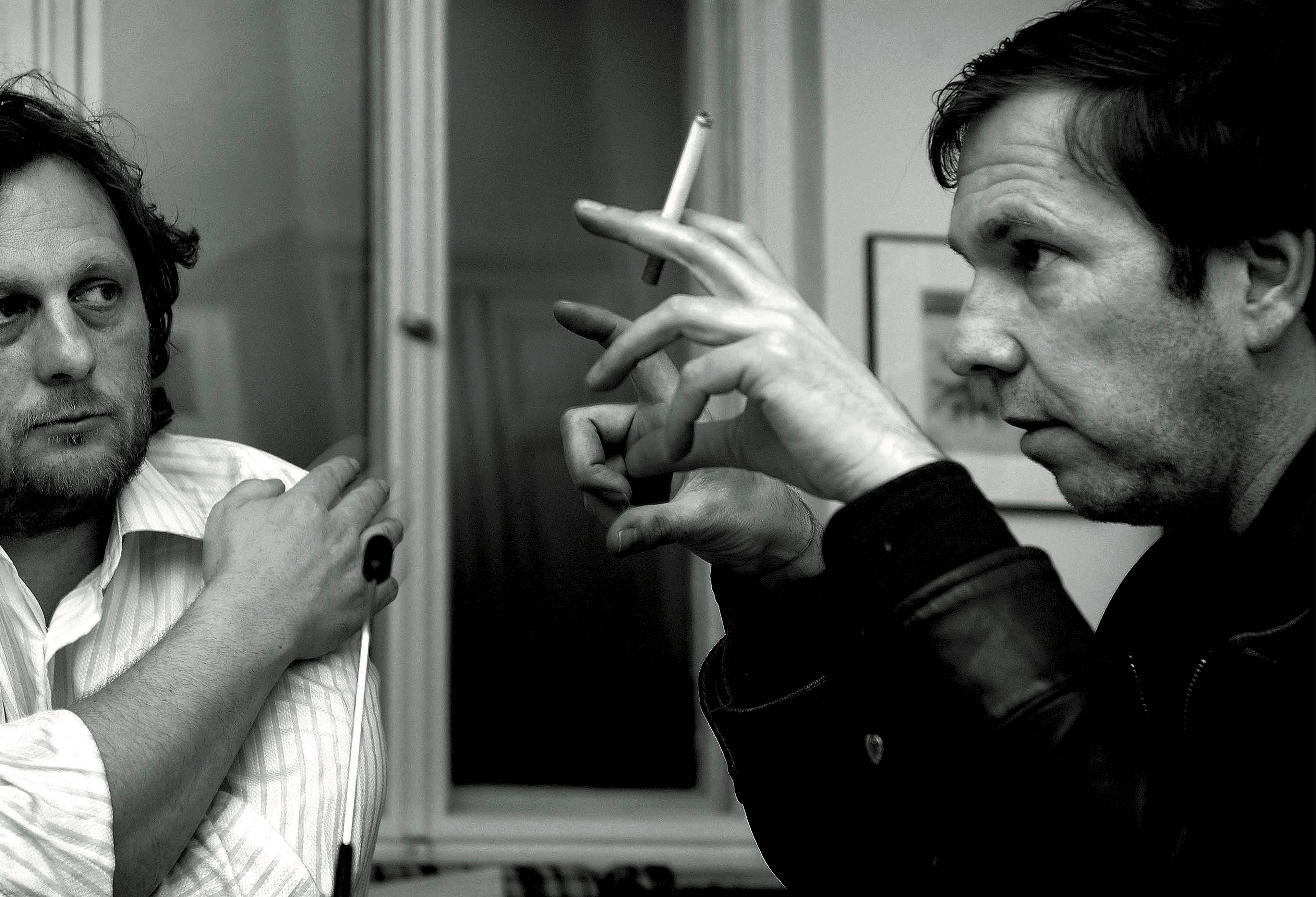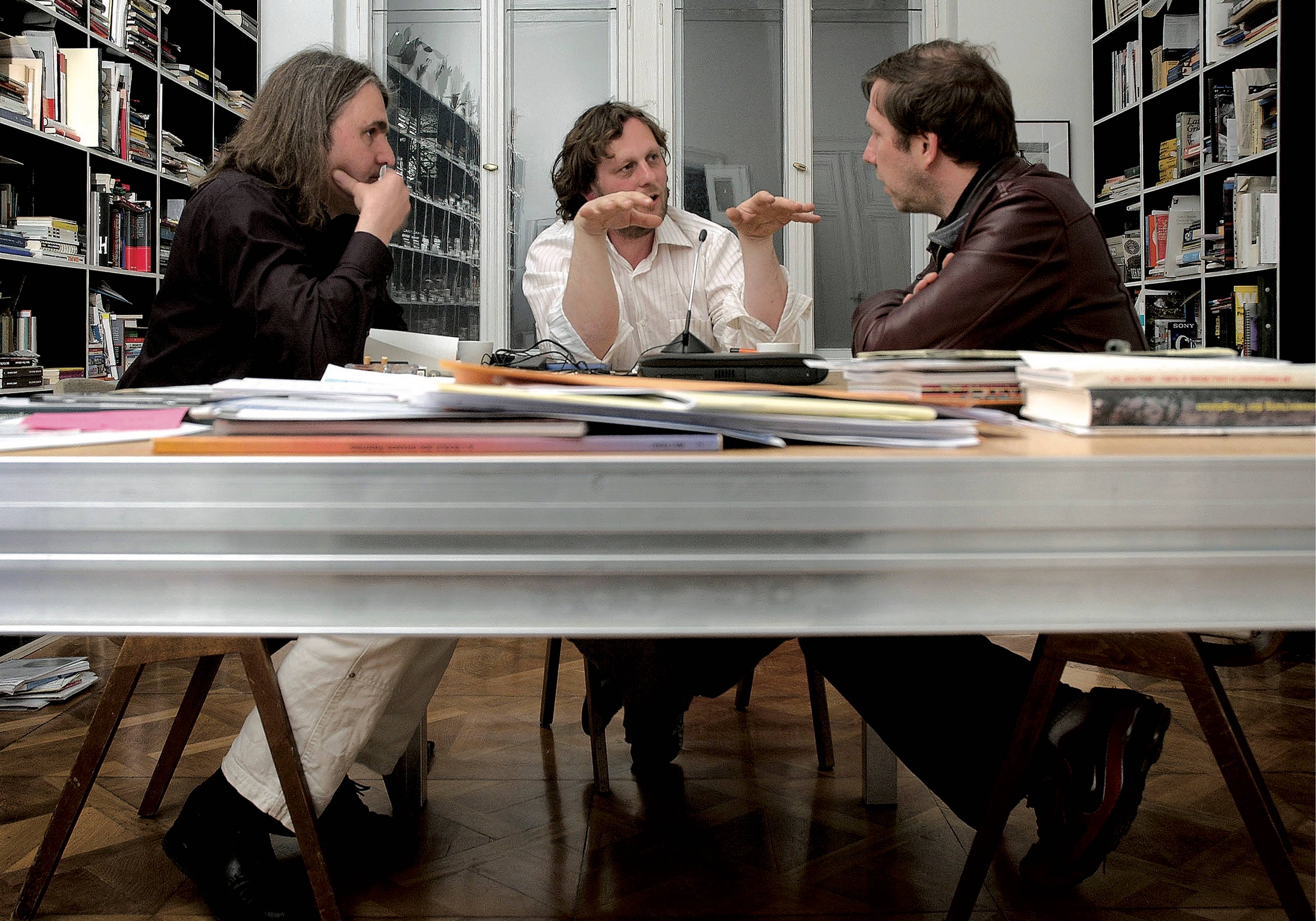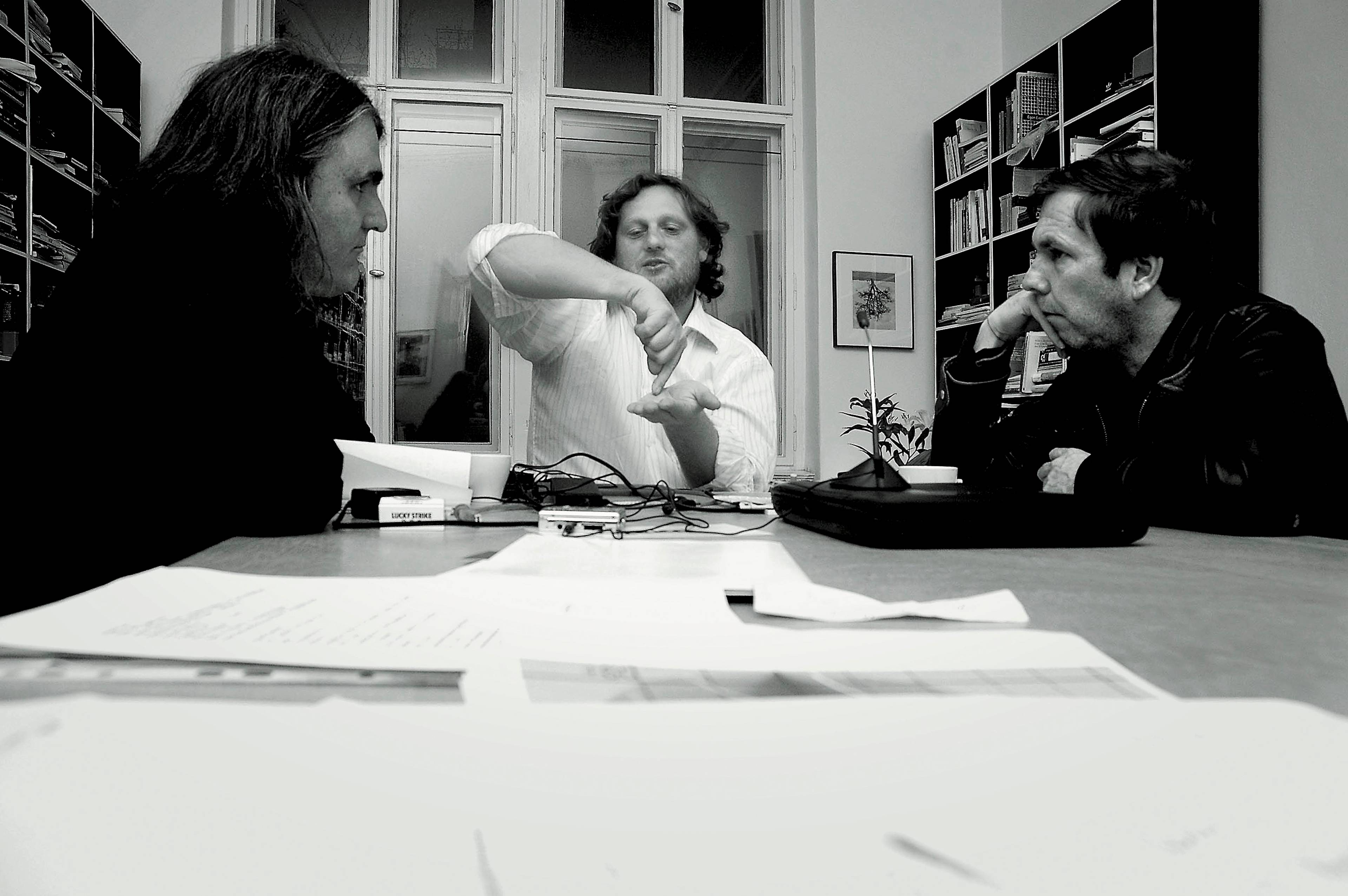The maverick Volksbühne intendant René Pollesch, who passed away unexpectedly at the age of sixty-one, was one of Germany’s most interesting 21st-century theater-makers. A hallmark of his work was his effortless transformations of dry theory into pop, staging text-collage critiques of capitalism as entertaining cascades of theory. In 2005, he spoke with the Conceptual artist Olaf Nicolai, who gained acclaim for his installations of artificial nature scenarios and used the “attention-generating machine” of the Venice Biennale as a marketing engine for an event in the starry sky, about their mutual interest in productive spectacle
Thomas Irmer: When René started at the Prater at Berlin’s Volksbühne, Olaf remarked after one performance: “Criticism is really fun there – it’s entertainment.”
Olaf Nicolai: I was fascinated by how theatrical means and theoretical statements are superimposed in such a way that, at first, I felt like I was in a hysterical spectacle of all the set pieces of theory that are currently in vogue, a kind of applied theory. You could likewise say it’s criticism as spectacle, yet also as criticism. And it is extremely entertaining. It’s such a stereotypical assertion that access to knowledge means a loss of enjoyment.
René Pollesch: Our evenings are not about depicting circumstances that have little to do with us as theater people, but about developing criticism from our own practice. This has also led to misunderstandings, as some critics have accused us of being merely self-referential and only acting out our artistic problems – especially those of the actors – as an insinuation of theater people’s luxury problems. But it’s only when we understand how we work that we can arrive at strategies for undermining such relationships.
ON: However, this could also be linked to a concept of aesthetics in which everyday life is not the exception, but an obvious prerequisite.
RP: I find it exciting to apply aesthetics to everyday life like that, but when people talk about aesthetics in the theater, I shut down very quickly, and I find it more useful to look at decisions related to content.
ON: It’s not about equating everyday life and aesthetics, but about how actions are organized: The how is where aesthetics come into play for me. If you use a quote in a play, it is crucial how it is spoken. Even if you bring an everyday scene one-to-one into the framing of the stage or the exhibition space, the situation changes: Its presentation is inevitably symbolic, which means that the visitor’s position also changes.
RP: Yes, but many people come to us as they would to conventional theater and don’t realize that the production process is much more important than whatever self-referentiality they perceive.
ON: But this propensity to assert a documentary manner of working surely also has to do with a longing for authenticity, as if what you show in the theater were not symbolic.
RP: What do you mean? I have a problem with the concept of the symbolic.
ON: The assertion that something is a document usually implies that it is unadulterated, not ideological. But every articulation arises within a nexus of interests, wishes, and desires. Thus, even if it claims the status of “document,” it is ideologized and, naturally, symbolic. There is no communication outside of the symbolic, even if that is the great desire. “… without knowledge & sense / the meadows graze sensually,” (ohne wissen und sinn / grasen sinnlich die wiesen) Reinhard Priessnitz wrote so beautifully.
Nothing is more devastating in the theater than working on the authentic. It makes people do things they would never dream of doing. That’s where the production of desire really comes into play – embodying everything you’re not.
RP: In theater, it is often the case that we can only communicate what has already coagulated in society to such an extent that it is understood. Our gesture, though, is more like this: The lives of all those involved – the actors as well as the audience – are so special that it cannot immediately be about something universally valid. What we reflect upon are the specifics. We are interested in everything that cannot normally be grasped in theater because it is not yet capable of being theorized and is marginalized as a consequence.
ON: In this context, I was also fascinated by how you thematize actions as products, which has become a matter of course in today’s economy.
RP: But theater critics hardly notice! What you are referring to was recognized by the visual arts as a critique of representation. For everyone else, however, it remained a representation of criticism, and soon, the same terms were repeated again and again in reviews – “effects of globalization” and the like.
TI: The material for your discourse theater can be found in non-fiction, such as urban studies and sociology, which is how it connects to current affairs. This material is incorporated in such a way that the players can actually start from their everyday lives, but can’t stay in them. It’s in this transition that the characters, whose speech acts convey criticism, seem to emerge. Is that your work as a writer-director?
RP: I choose these texts according to whether they are useful for me and could be useful for the actors, that is, whether they have something to do with our everyday lives in such a way that the actors can also make statements about themselves. I mean that likewise in the sense that they have not yet coagulated into a statement about everyone else.
ON: When it comes to socialization through texts, the relationship between fiction and theory tends to be reversed. Theory, like poetry, can also format its readers or listeners emotionally. The pleasure begins where reading affects one’s own experience.
TI: What interests you both in how our present economy structures need, wherein people rapidly dissolve and reassemble their self-images?
RP: How wishes become orders; or, why someone auctions off their arm on eBay to have a company logo tattooed on it.
ON: Or, how orders become wishes. A friend of Douglas Gordon’s owns a work of his, a tattoo of the word “Guilty” written on his back in reverse, such that it can only be read in the mirror – in what Lacan claims is the medium of self-constitution. It superimposes alienation, desire, self-management, and staging as a commodity.
From left to right: Thomas Irmer, Olaf Nicolai, and René Pollesch, 2005
RP: My question in the theater is always about how to narrate these processes of subjectivation, which today revolve around marketable self-design, the claim “I think that this is me.”
ON: This is not about a return to an alienated authenticity, but about a now in which a character demands: “I want to be deregulated.”
RP: Because it is a chance.
ON: These are ambivalences that have negative connotations in traditional criticism and suddenly appear as options for action to radicalize market logic.
RP: And simultaneously contradict it: The actor-characters can criticize, say the opposite, show solidarity with each other, and turn everything around again.
TI: What kind of critique are we talking about here? It is precisely the small, marginalized sociotopes (including theater) that seem to have abandoned the project of a broader critique of economy and society.
RP: This total approach to criticism doesn’t work for me. First of all, criticism is about specifics, not big statements.
TI: I have a completely different impression, namely, that there are many people who view your works in a much larger context and practically see them as inward-looking, documentary theater of their socio-economic circumstances.
RP: This has become a matter of the style of plays considered equivalent to turbo-capitalism. Another misunderstanding.
ON: It is possible, however, that this misunderstanding stems from turbo-capitalism itself, because theater criticism draws on its entertainment forms for comparison, and thus wants to prove its critical potential.
RP: None of what we do has a model on television. The talk shows, where unreflecting subjects are paraded in an unreflective and truly deregulated way, are the opposite of our work. I encourage the actors not only to distance themselves from each other, but also from myself, as the director who wants their work.
The playwright is expected first and foremost to come to a conclusion, which he spits out as a serious statement. That’s exactly what we fail to do, to produce insights or conclusions.
TI: Does this create the authenticity that people like to see in your actors’ characters?
RP: Nothing is more devastating in the theater than working on the authentic. It makes people do things they would never dream of doing. That’s where the production of desire really comes into play – embodying everything you’re not. Nevertheless, the concept of authenticity plays a big role for me, and actors talk about themselves during rehearsals, as they are supposed to. That’s what their work with me is about: The way of playing is part of the process. What it’s not about is the authenticity of an individual.
ON: In the visual arts, this problem exists on a different level. Your position as an author is often identified with the statement of a work. The artist is thought of as “expressively identical.” The fact that the position of an author is not to say “I” and to mean themself is taken for granted in literature.
RP: As actors, directors, set designers, and authors, we are first and foremost an affirmation, as well as a thorn in the side of this business. Because our productions are about overturning these traditional roles in which the director works as a sexist power-monger and the actors as his victims.
TI: And you as an author?
RP: For example, I can make sure that the quantities of texts and the parts are distributed fairly. That’s where the possibility of solidarity begins – that nobody says that they only have a supporting role, that someone else got the leading role again. A playwright normally doesn’t think about that at all. They write in an artistic production process that completely excludes this. This is a kind of democratization that calls into question the vision of the autonomous artist – as an author and director, I am absolutely in favor of this, even if my esteemed Volksbühne colleagues Carl Hegemann and Christoph Schlingensief believe that a brilliant artist can achieve more than a collective.
ON: But aren’t works by successful artists inevitably identified with the decisive signifier “AUTHOR,” in your case “Pollesch,” no matter to what extent the product is based on an actual division of labor?
TI: This is why there is sometimes talk of the “Polleschization” of theater, in which everything from the cast to the choice of music is attributed to your concept alone.
RP: Unfortunately, this most often adheres to a completely false image of the artist. The stereotype of the romantic self-destroyer who is solely absorbed in their art and burns themselves out for it everywhere – right down to using drugs and alcohol as a lubricant – I could become really intolerant of that.
From left to right: Thomas Irmer, Olaf Nicolai, and René Pollesch, 2005
ON: The extent to which subjects are equated with individuals can be addressed and directly involved in the work. If I delegate design decisions to architects, for example, then I no longer get involved. Their product appears under my name and I refer to their design in the title.
RP: As an author, I try to take account of the fact that the authors I use receive royalties. Here, too, I don’t see myself as an autonomous producer, but rather that I am continuing with writing their texts. I give the actors something to work on. If the texts turn out to be duds, I bring something else the next day. That’s why I don't see myself as a writer of masterpieces or of literature – I don’t believe in that concept. It’s about wanting to understand something.
TI: There is a lot of laughter in your performances, probably because the criticism, which meets the everyday world of helpless self-exploitation with lofty discourses on the dissolution of the subject, remains ambivalent.
ON: It’s great how the registers of theory used in serious argumentation or discussions, including ours, suddenly take on the quality of extremely good jokes.
RP: I don’t use theory to embarrass or caricature it.
ON: I don’t mean that either. But suddenly, these heavy chunks of theory work like entertainment, perhaps also at odds with the intentions of their authors. Theorists like Žižek and Agamben, who are constantly on tour, are doing the same thing for their audience.
RP: Yes, they are sexy. And this condition of concept production in today’s economy also demands reflection.
ON: In the visual arts, “entertainment” and “spectacle” are buzzwords that people are afraid to use to support market logic. But the spectacle is a natural experience today, so why shouldn’t it be productive? Especially when it sounds so unbroken: “The fun is over! Now the serious side of life begins again!” That sounds like: “Stop giggling! Your opinion, please!”
RP: It’s definitely comparable. The playwright is expected first and foremost to come to a conclusion, which he spits out as a serious statement. That’s exactly what we fail to do, to produce insights or conclusions. The text per se is not so important – the actors have to make it important without being the author’s mouthpiece.
ON: The difficulties begin as soon as you extend the production process beyond a given framework. In a design competition on the site of Leipzig’s destroyed synagogue, I suggested the area be declared extraterritorial. This attempt was to be documented in detail, despite my having already obtained a legal opinion that spoke of the general impossibility of such a suggestion. For me, this material would have been the real work, a chance to understand why something does or does not function. Evidently, it doesn’t meet the expectations of a memorial site.
RP: For me, this is an example of the misappropriation of everyday life. Success guarantees nothing, only misunderstandings at best.
ON: Probably not even that, but only the kind of consent that commits one to nothing at all.
____




